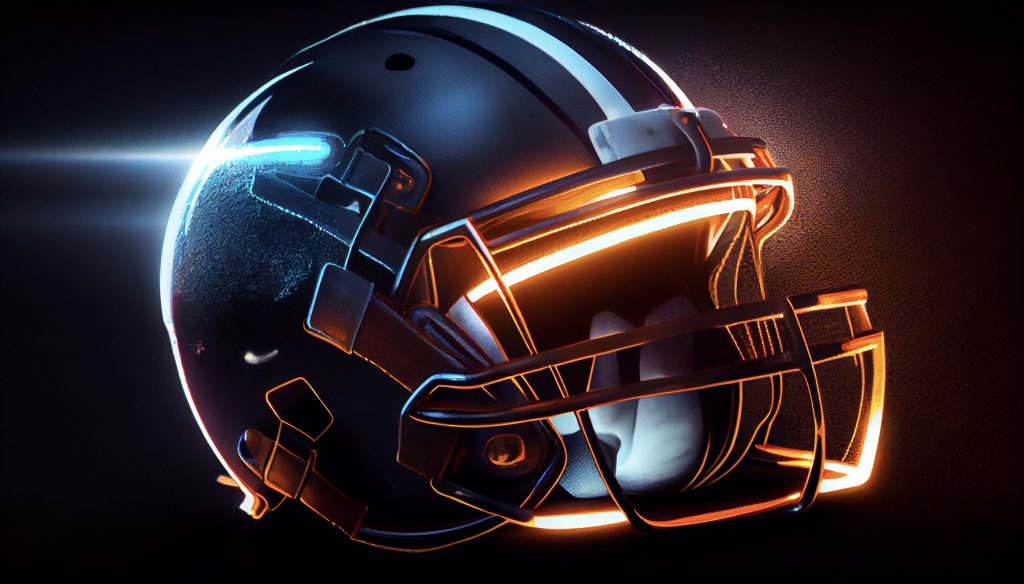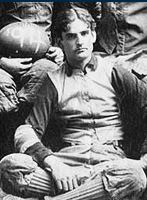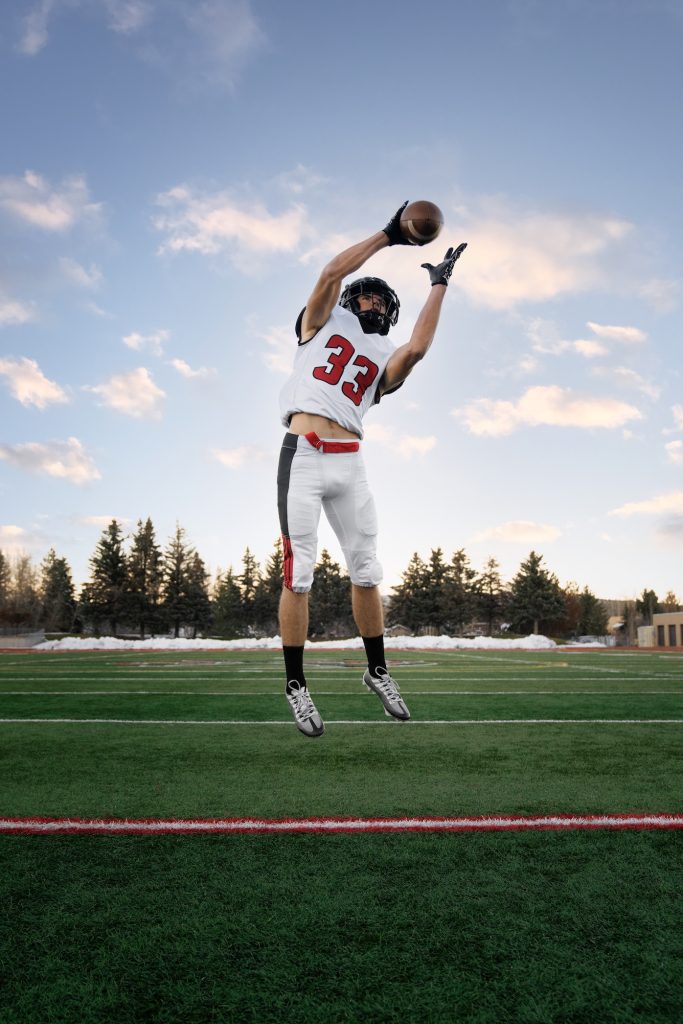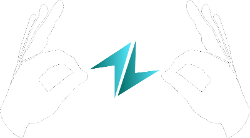On October 7, 2023, the Gallaudet University Bison football team made history when they played while wearing helmets designed for Deaf and hard of hearing players. Gallaudet, a private college for Deaf and hard of hearing students located in Washington D.C., defeated the visiting Hilbert College Hawks by a score of 34-20 in the momentous game.

New Technology for Deaf Players
A few years ago, the idea of using technology to enable Deaf players to communicate and read plays on their helmets was proposed. This concept became a reality when AT&T partnered with Gallaudet University to develop the technology.
The 5G-connected helmet utilizes the same technology that enables cell phones to connect across the United States.
AT&T placed a microprocessor inside a Riddell helmet and connected it to a lens mounted on top of the facemask. This allows a coach to select a play on a tablet and send it to the player, who can then see the play displayed on the lens.
Kellyn Smith Kenny, AT&T’s chief marketing and growth officer, says the project started about two years ago when AT&T noticed pro football players typically get audio coaching through radio headsets. With a long history of offering technology to aid the deaf community, AT&T saw an opportunity to adapt their tech for the NFL.
To develop a lightweight, comfortable, and safety-compliant helmet, AT&T and Gallaudet created multiple versions through an iterative design process.
The helmet that debuted on the field was built by sporting-goods maker Riddell. It first saw field action in practices and scrimmages, where players verified that the display did not interfere with their focus on the game. The helmet’s 5G connectivity helped guarantee there was effectively zero delay in communications, according to Riddell.
Gallaudet University’s Football Innovations
Since its establishment, Gallaudet University has a history of pioneering communication innovations. For example, in 1894 the university’s football team introduced the huddle, standing closely together to sign plays without alerting opponents.

Image from Wikipedia.
First Experimental Deaf Players to Use the Tech-Helmets
Gallaudet University quarterbacks Brandon Washington and Trevin Adams are the athletes for whom the 5G-enabled helmets were designed. The helmets are giving them the opportunity to shine on the national stage, including in an AT&T commercial that debuted during ESPN’s “College GameDay.” In the commercial, Washington cheers beside coach Goldstein as Adams scores a touchdown using the high-tech helmet. The soundtrack, a cover of “The Sound of Silence” sung by partially deaf artist Amira Unplugged, and open captioning in the videos promote accessibility.
Washington, a junior from Citronelle, Alabama, wore the new helmet and scored three touchdowns as the Bison defeated Hilbert. He provided feedback to AT&T during the helmet’s development, noting that initial prototypes were too heavy because of large battery packs. This is Washington’s second season as quarterback after being moved from wide receiver by coach Goldstein to address positional needs.
He was named ECFC Offensive Player of the Year last year when the team won the conference championship. In that season, he had 1,363 yards of total offense and scored eight rushing touchdowns.
Last year, Adams led the California School for the Deaf-Riverside to an undefeated season and an 80-26 victory in the eight-man football championship game. Adams chose to attend Gallaudet University because both of his parents were alumni. His father had even played football for Gallaudet’s Bison team. Adams’ family attended Gallaudet’s 150th anniversary celebration during the 2013-2014 school year, sparking his desire to continue the family’s tradition at the school.
“Trevin coming in, and as a freshman, has really been a blessing,” coach Goldstein said. “He is the future of this program, of this team, of this community. He’s great. The future is really looking good. We’re OK, we’re gonna be in good hands for the next four more, three more years after this.”
Coach Goldstein – USA Today

Image by Freepik.
In addition to displaying plays, the helmet alerted Washington when to look to coach Goldstein for further messages in ASL. This helped address a disadvantage deaf and hard-of-hearing players face in the game: not knowing when a coach tries getting their attention without constantly looking between the field and sidelines.
Goldstein believes this technology could greatly benefit deaf and hard-of-hearing middle and high school players, who typically end up playing defense because they struggle to effectively communicate with coaches on predominantly hearing teams. Despite their diligent training and effort, deaf and hard-of-hearing players remain at a clear disadvantage when trying to receive instructions from coaches and officials during games.
“Every other game that we prepare for, we do what we normally do and I think people don’t realize is, when we communicate in our language, ASL, we’re pretty fast. We’re efficient. We’re fast,” he said. “What this does, this helps level the playing field with limiting mistakes, getting somebody’s attention. When Trevin’s in the game, and he’s further away, he’s not looking at me, I cannot get (his attention). We’re living with whatever play that’s called, that’s it. This gives us an opportunity for me to get his attention. There’s a red exclamation point on the tablet, I hit it, it pops up. He knows automatically to stop what he’s doing and look at me.”
Coach Goldstein – USA Today
Advancing Equality at Gallaudet
Gallaudet University takes pride in pioneering innovative ways to advance equality for deaf and hard-of-hearing people. The university’s president, Roberta “Bobbi” Cordano, made history as Gallaudet’s first deaf female president and first openly LGBTQ leader. Her groundbreaking presidency earned her recognition from USA Today as one of their Women of the Year for her exceptional leadership.
“I think it’s the daily work of being president of Gallaudet to advance equality. That’s my job. That’s what I do,” she said. “And to make sure that our students have the opportunity and the preparation and the tools they need to go out into the world and thrive. That’s advancing equality.”
Roberta “Bobbi” Cordano – USA Today
“I wanna make sure people understand: Our players, no matter what, any game we show up, it doesn’t matter who the opponent is or who we have on our roster, we’re never gonna have a level playing field. We just won’t,” Goldstein said. “There is a communication barrier.” (USA Today)
Continuing Barriers
While the 5G-connected helmet is a major breakthrough, significant barriers remain in creating equity for deaf and hard-of-hearing athletes. Officials who do not use sign language present challenges.
Additionally, Gallaudet players cannot hear whistles, posing potential safety risks. Moreover, the NCAA only authorized the helmet’s use for one game and only by the quarterback, limiting its impact.
The company [Riddell] is exploring how the technology could be used in future NCAA games and other fields where helmets are worn, such as emergency response. The company is speaking with the NCAA and people in emergency response to determine how the technology might be deployed in their respective fields.
Update on Deaf Accessible Football Helmet as of October 28th 2024
After a successful limited debut in Gallaudet’s October 2023 game, in September (2024), the NCAA has recently granted approval for the continued use of tech-enhanced football helmets by Deaf and hard of hearing players for the remainder of the 2024 season.
This approval allows players, including those at Gallaudet University, to benefit from helmets equipped with advanced communication features, such as visual signals and tactile alerts. This decision underscores the NCAA’s commitment to inclusivity, ensuring that all athletes can compete safely and effectively by adapting to their specific needs.
Until next time, ta ta! 😄🤟🏻



